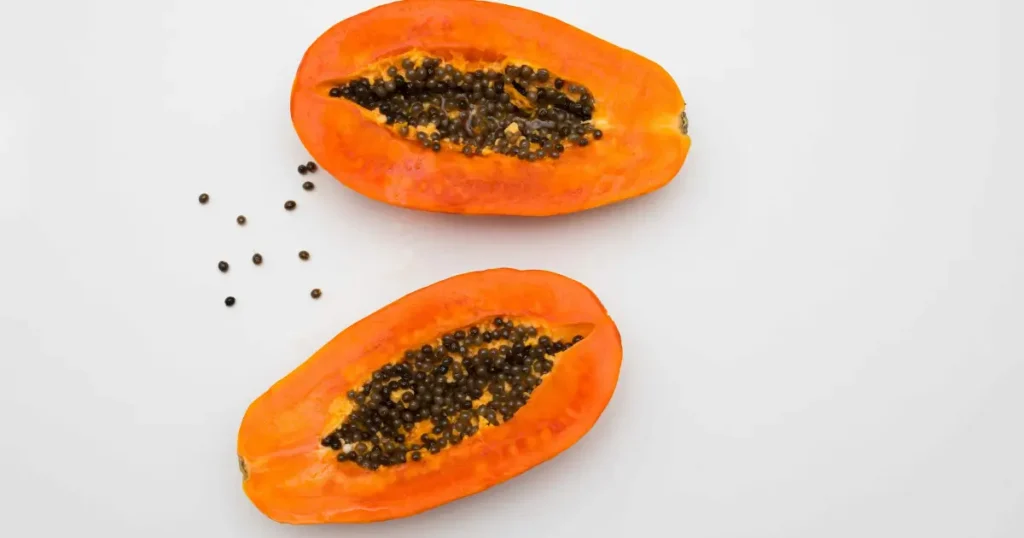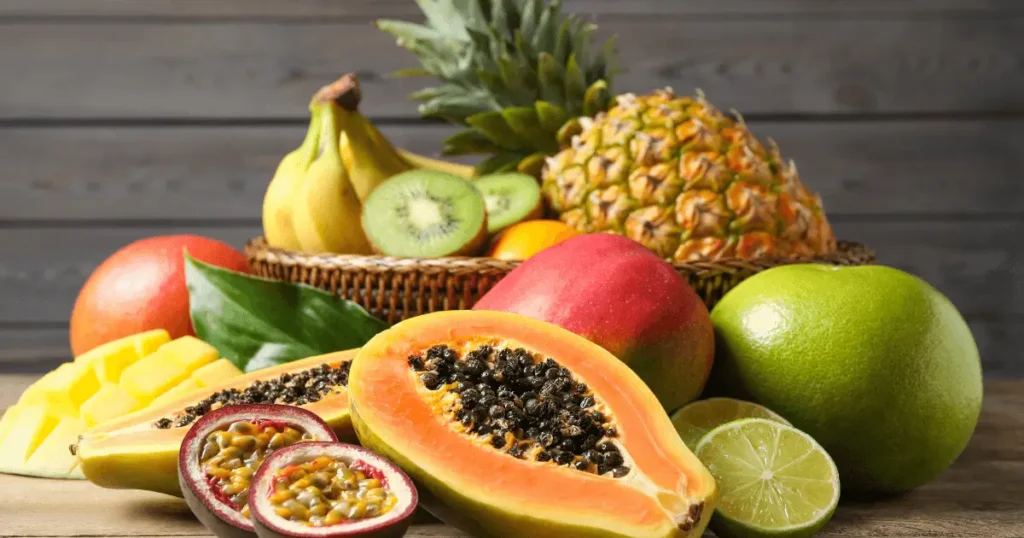Can Dogs Eat Papaya: 7 Powerful Benefits & Smart Serving Tips
If you’ve ever enjoyed the sweet, tropical taste of papaya and found your furry friend giving you those pleading eyes, you may have wondered: Can dogs eat papaya? The good news is that papaya can be a healthy addition to your dog’s diet when prepared and served correctly. This vibrant orange fruit offers several nutritional benefits for canines, but there are also important considerations to keep in mind. Let’s explore everything you need to know about feeding papaya to your four-legged companion.
Table of Contents
Is Papaya Safe for Dogs?
Yes, the flesh of ripe papaya is generally safe for dogs to eat. If you’re wondering, “Can dogs have papaya?” – the answer is positive. Papaya fruit contains valuable nutrients that can support your dog’s health when offered in moderation. Many veterinarians confirm that can dogs eat papaya safely as it doesn’t contain toxic compounds that would cause immediate concerns for your pet.
However, while the question “Can dogs have papaya?” has a positive answer, there are important qualifications. The seeds, skin, and leaves of the papaya plant should not be given to dogs. Additionally, like any new food, papaya should be introduced gradually and in small amounts to monitor how your individual dog responds to it.
7 Nutritional Benefits of Papaya for Dogs

When addressing the question “Can dogs eat papaya fruit safely?”, understanding its nutritional profile helps explain why it can be a healthy occasional treat.
“Can dogs eat papaya for health benefits?” is a question that many pet owners have. Papaya has the following seven main benefits for your dog:
1. Rich in Digestive Enzymes
Papaya contains papain, a powerful enzyme that aids in breaking down proteins and can support healthy digestion in dogs. For dogs with sensitive stomachs or sporadic digestive problems, this can be especially helpful.
2. Excellent Source of Vitamins
This tropical fruit provides several essential vitamins:
- Vitamin A: Promotes cellular growth, immunological response, and vision.
- Vitamin C: Promotes immune function and serves as an antioxidant.
- Vitamin E: Promotes healthy skin and coat
- Folate (B9): Assists with cell function and tissue growth
3. High Fiber Content
The fiber in papaya can help support regular bowel movements and proper digestive function in dogs, potentially alleviating minor constipation issues.
4. Anti-Inflammatory Properties
Papaya contains several compounds with anti-inflammatory properties that may help reduce inflammation in dogs with certain health conditions.
5. Hydration Support
With its high water content (approximately 88%), papaya can contribute to your dog’s daily hydration needs, especially during warmer months.
6. Calcium and Potassium
These minerals support bone health, muscle function, and proper nerve signaling in your dog’s body.
7. Antioxidant Protection
The vibrant orange color of papaya comes from carotenoids (including beta-carotene), which are powerful antioxidants that can help combat cellular damage from free radicals.
While these benefits are impressive, remember that papaya should be just one small component of a balanced diet. Commercial dog food should remain the primary source of nutrition for your pet.
Potential Risks of Feeding Papaya to Dogs

Despite the benefits, there are some important considerations before feeding papaya to your dog:
Sugar Content
Papaya contains natural sugars that, while not as concerning as added sugars, should still be limited in your dog’s diet. Too much sugar, even from natural sources, can contribute to weight gain and dental issues.
Digestive Upset
Some dogs may experience digestive upset when trying new foods, including papaya. Symptoms might include:
- Diarrhea
- Vomiting
- Gas
- Stomach discomfort
Allergic Reactions
Though rare, some dogs may have allergic reactions to papaya. Signs to watch for include:
- Itching
- Hives
- Swelling (particularly of the face)
- Difficulty breathing (in severe cases)
If you notice any of these symptoms after your dog eats papaya, discontinue feeding it and consult your veterinarian.
Choking Hazard
Large pieces of papaya could potentially pose a choking hazard, especially for small dogs or those who tend to gulp their food without properly chewing.
Can Dogs Eat Papaya Seeds?
No, dogs should not eat papaya seeds. When considering “can dogs eat papaya?” it’s crucial to understand that this only applies to the flesh. While you might be wondering, “Can dog eat papaya completely whole?” the answer regarding seeds is definitely negative. Papaya seeds have a bitter flavor that most dogs would find disagreeable, and they contain trace amounts of cyanide compounds.
Additionally, papaya seeds contain enzymes that can interfere with protein digestion when consumed in large quantities. They can seriously upset a dog’s digestive system and have a faintly peppery taste.
Always remove all seeds before giving papaya to your dog. This is non-negotiable for your pet’s safety.
How to Properly Prepare Papaya for Dogs
If you’ve determined that can dogs eat papaya safely based on your pet’s health profile, here’s how to prepare it properly. When serving papaya to dogs, follow these steps for the best experience:
Step 1: Select a Ripe Papaya
Choose a ripe papaya with bright orange flesh. Unripe papaya contains higher levels of latex, which can cause digestive upset.
Step 2: Wash Thoroughly
Wash the exterior of the papaya thoroughly to remove any pesticides or contaminants that might be present on the skin.
Step 3: Remove Skin and Seeds
Cut the papaya in half and:
- Scoop out all seeds and discard them
- Peel away the skin completely
- Ensure no seeds or skin remain attached to the flesh
Step 4: Cut Into Appropriate Sizes
Cut the papaya flesh into small, bite-sized pieces appropriate for your dog’s size. Smaller pieces reduce the risk of choking and make it easier for your dog to digest.
Step 5: Serve in Moderation
Offer just a few pieces initially to see how your dog responds before incorporating papaya as an occasional treat.
Fresh is Best: Always serve fresh, raw papaya rather than dried or preserved varieties, which often contain added sugars or preservatives that aren’t healthy for dogs.
How Much Papaya Can Dogs Eat?
When giving your dog papaya, moderation is essential. Pet owners asking “Can dogs have papaya regularly?” should understand that it should be an occasional treat. This is a broad guide based on the size of the dog:
| Dog Size | Recommended Papaya Serving | Frequency |
|---|---|---|
| Small (under 20 lbs) | 1-2 small pieces (1 tsp) | 1-2 times per week |
| Medium (20-50 lbs) | 1-2 tablespoons | 1-2 times per week |
| Large (over 50 lbs) | 2-3 tablespoons | 1-2 times per week |
Remember that treats, including fruits like papaya, should make up no more than 10% of your dog’s daily caloric intake. The majority of their nutrition should come from high-quality dog food formulated to meet their nutritional needs.
Signs Your Dog May Not Tolerate Papaya Well
When introducing papaya to your dog’s diet, watch for these signs that may indicate the fruit doesn’t agree with them:
- Vomiting or diarrhea within 24 hours of consumption
- Decreased appetite or refusal to eat regular meals
- Excessive drooling or pawing at the mouth
- Lethargy or unusual behavior
- Gas or bloating
- Signs of an allergic reaction, like itching, hives, or swelling
If you notice any of these symptoms, discontinue feeding papaya and consult your veterinarian if symptoms persist or worsen.
Dogs That Should Avoid Papaya
While many healthy adult dogs can safely enjoy small amounts of papaya, certain dogs should avoid this fruit. When determining “can dogs eat papaya?” for your specific pet, consider these exceptions:
- Dogs with diabetes: Due to the sugar content
- Dogs with pancreatitis: Complications could result from the fiber and sugar.
- Dogs with known food allergies: Especially if they’re sensitive to new foods
- Dogs on certain medications: Always check with your vet about potential food interactions
Before giving your dog papaya or any other new food, find out from your veterinarian if your dog has any long-term medical issues or is on medication.
Papaya vs. Other Fruits for Dogs

When considering whether can dogs eat papaya compared to other fruits, here’s how it stacks up. The question “can dogs eat papaya fruit?” is addressed by this comparison. In context with other common options:
| Fruit | Safety for Dogs | Main Benefits | Considerations |
|---|---|---|---|
| Papaya | Safe (flesh only) | Digestive enzymes, vitamins | Remove seeds and skin |
| Mango | Safe (flesh only) | Vitamins A, B6, C, E | Remove pit and skin |
| Banana | Safe | Potassium, fiber | High in sugar |
| Watermelon | Safe (flesh only) | Hydration, vitamins | Remove seeds and rind |
| Apple | Safe (flesh only) | Fiber, vitamins | Remove seeds and core |
As you can see, many fruits can be safely fed to dogs when properly prepared, but each has specific parts to avoid and unique nutritional profiles.
While papaya offers tropical flavor and digestive benefits, some dogs may prefer milder options like applesauce, which provides different but complementary nutritional advantages.
Unlike dates, which contain extremely high sugar levels, papaya provides nutritional benefits without excessive sweetness.
Unlike watermelon rind, which can be difficult to digest, papaya flesh is naturally soft and contains beneficial digestive enzymes.
Papayas’ enzyme content makes them kinder to most dogs’ digestive tracts than acidic fruits like mandarins.
Persimmons contain seeds that pose serious risks, making them much higher-risk than papaya’s easily removable seeds.
Key Takeaways
- Can dogs eat papaya fruit? Yes, the flesh of ripe papaya is safe for most dogs when properly prepared and served in moderation.
- Can dogs eat papaya seeds? No, always remove all seeds as they contain compounds that could be harmful.
- Before giving your dog papaya, always peel it.
- Start with small amounts when introducing papaya to your dog’s diet.
- Keep an eye out for symptoms of allergic reactions or an upset stomach.
- Papaya offers several nutritional benefits, including digestive enzymes, vitamins, and minerals.
- Some dogs should not eat papaya at all if they have certain medical conditions.
Conclusion
So, can dogs eat papaya? The answer is yes, with proper preparation and moderation. This tropical fruit can be a nutritious addition to your dog’s diet, providing digestive enzymes, vitamins, and hydration support. For pet owners wondering “can dogs eat papaya safely?” – the key is proper preparation by always removing the seeds and skin, cutting the fruit into appropriate sizes, and introducing it gradually.
Regarding the query, “Can dogs have papaya?” remember that while it offers health benefits, it should never replace a balanced diet of high-quality dog food appropriate for your pet’s life stage and health needs. As with any dietary change or addition, consider consulting with your veterinarian, especially if your dog has existing health conditions.
By following the guidelines outlined in this article, you can safely share this tropical treat with your canine companion and add a bit of nutritious variety to their diet.
Frequently Asked Questions
How often can I feed my dog papaya?
Most dogs can safely enjoy small amounts of papaya once or twice a week. For pet owners wondering, “Can dogs eat papaya regularly?” No more than 10% of your dog’s daily calories should come from treats, such as fruits like papaya.
What should I do if my dog accidentally eats papaya seeds?
If your dog consumes a few papaya seeds, monitor them closely for signs of digestive upset. A small number of seeds is unlikely to cause serious harm but may lead to stomach discomfort. If your dog consumes a large quantity of seeds or shows symptoms like vomiting, diarrhea, or lethargy, contact your veterinarian.
Can puppies eat papaya?
Compared to adult dogs, puppies’ digestive systems are more delicate. While small amounts of papaya flesh likely won’t harm a healthy puppy, it’s best to wait until they’re at least 12 months old before introducing treats like papaya. Always consult with your veterinarian before giving your puppy any human foods.
Is dried papaya safe for dogs?
Most commercially dried papaya contains added sugars or preservatives that aren’t healthy for dogs. For those asking, “Can dogs eat papaya?” In its dried form, look for unsweetened, preservative-free options and offer even smaller amounts than you would fresh papaya, as the sugar content is more concentrated in dried fruit.
Can papaya help with my dog’s digestive issues?
The papain enzyme in papaya may help with minor digestive issues in some dogs. However, before using papaya or any other food as a remedy, speak with your veterinarian if your dog has ongoing digestive issues. Persistent digestive issues require proper veterinary diagnosis and treatment.







